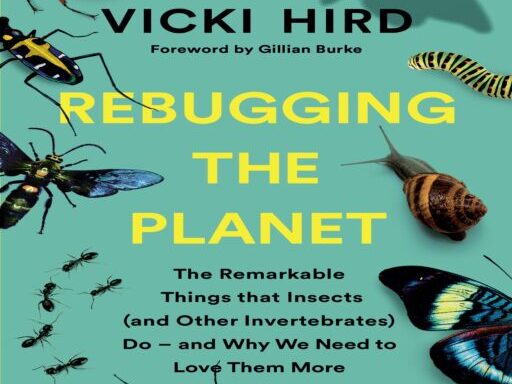Voiced by Sir Mark Rylance and filmed in the ruins of Tintern Abbey, Almost Invisible Angels2 shows people re-connecting with the tiny creatures that form a threatened link in the food chains we all depend on. Griffiths’ message that “Insects are – truly – the angels” celebrates the bounty that insects bring to us dailyand almost invisibly, and urges us to cherish them. A score composed and performed by folk-singer, and Music Declares Emergency9 activist, Sam Lee7, and violinist Anna Phoebe8, echoes the deep grief and poignant hope present in Rylance’s powerful narration.
Watch the film here: https://www.youtube.com/watch?v=_7j4-ysBlvo
(This link will become public on Monday 20/6.) A high-resolution version suitable for screenings is available, on request.
Jay Griffiths, whose books include Why Rebel and Wild: An Elemental Journey, says:
“Imagine if our food were brought to us by dedicated and almost invisible angels. Imagine them flying, effortless and iridescent, with a beauty more extraordinary than any art of ours can ever replicate. Imagine if those mysterious beings worked freely to keep alive almost the entire living world, including birds, animals and ourselves. I wish that everyone who said they believed in angels would actually believe in insects. When I heard about the collapse of insect populations, I cried for three days. I saw in one awful moment a vision of the desolated world, a devastated wasteland.”
Pollution, monocultures, climate change and insecticides have brought invertebrate populations to an unprecedented low in most countries in the world. In Britain, climate disruption and intensive farming have caused a 60% decline in flying insects in just 20 years, and a global report in the journal Biological Conservation says a quarter of insects could be wiped out within just a decade11.
As well as their essential role in wild eco-systems, insects contribute to the pollination of over 80% of the crop species farmed across Europe. And as populations rise and diets change this reliance is growing. According to the University of Reading’s Sustainable Pollinator Services12, in the last 20 years, the area of cultivated land in the UK dependent on insect pollination has increased by 38%. Whereas the loss of key species will affect the yield of particular crops dependent on these specialist pollinators (such as the reliance of field bean production on the long-tongued bumblebee), the general decline in insect biodiversity, alongside mounting stress caused by climate change and resulting global unrest, impacts food security more broadly.
Almost invisible Angels is being released to coincide with Insect Week, an initiative run by the Royal Entomological Society and partner organisations, such as Buglife13, to encourage people of all ages and backgrounds to learn and care more about insects.
Vicki Hird6, Fellow of the Royal Entomological Society and the authorof Rebugging the Planet – The Remarkable Things that Insects (and Other Invertebrates) Do – And Why We Need to Love Them More says:
“Hammered by pollution, climate change and lost habitats, insect numbers and diversity are crashing everywhere. From beetles to butterflies, wasps to worms, these angels need everyone to act, to demand far stronger policies, to eat differently, and to re-bug the planet everywhere.”
Almost Invisible Angels isthe latest in a series of collaborative artworks curated by Writers Rebel. Paint the Land2 brings together creative teams to write bold messages on rural and urban landscapes, highlighting the climate and ecological emergency. Previous pieces have included work by Booker prize-winning writer Ben Okri, Costa prize-winning Monique Roffey, and artist-activists Ackroyd and Harvey, Zac Ove and Ebon Heath.
Artist Gaby Solly, member of Culture Declares Emergency10, says:
“I’ve campaigned and protested about environmental destruction since I was a teenager, and I continue to fight now for the future of my children, and for those of all species on our precious Earth. Societies, such as ours in the UK, have become dangerously divorced from nature, and forgetting this crucial interdependence threatens our very existence. I hope that Almost Invisible Angels will help to open hearts and minds, and encourage others to urgently demand radical, regenerative change from those in power, for all our sakes.”
Musician Anna Phoebe, member of Music Declares Emergency, says:
“I found writing the music for this beautiful film an incredibly intuitive process. I wanted the music to reflect the depth and severity of the eco-crisis, grounding the piece in stark reality, but also connecting the viewer to the abundance and beauty of nature, and to the immense importance of these small insects within the expanse of our planet.”
Information for Editors
AVAILABLE FOR INTERVIEW
· Writer, JAY GRIFFITHS: 07967 692 893
· Artist GABY SOLLY: 07947577503
· Entomologist VICKI HIRD: 07903478249
· Composer ANNA PHOEBE: 07932724483
1. Writers Rebel aims to galvanise writers and the publishing, literary and creative industries to commit to tell the truth about the emergency, and to inspire readers and the public to take action for social and cultural transformation. Read blogs from A L Kennedy, Zadie Smith, Ed Vulliamy, Sir Simon Schama and many others at https://writersrebel.com, and read Jay Griffiths’ blog on her inspiration for Almost Invisible Angels at https://writersrebel.com/insects/
2. Visit the Paint the Land website for more resources and information about Almost Invisible Angels: https://www.painttheland.org/almostinvisibleangels
and other campaigningartworks: https://www.painttheland.org/
3. Royal Entomological Society- Insect Week: https://www.insectweek.co.uk
4. Writer, Jay Griffiths: http://jaygriffiths.com
5. Artist, Gaby Solly: https://solly104.wixsite.com/gabysolly
6. Entomologist, Vicki Hird: https://rebuggingtheplanet.org
7. Musician, Sam Lee: https://samleesong.co.uk
8. Musician, Anna Phoebe: https://www.annaphoebe.com
9. Music Declares Emergency: https://www.musicdeclares.net
10. Culture Declares Emergency: https://www.culturedeclares.org
11. Journal of Biological Conservation: https://www.sciencedirect.com/science/article/pii/S0006320719317823
12. Sustainable Pollinators Services, University of Reading: http://www.reading.ac.uk/caer/Project_IPI_Crops/project_ipi_crops_index.html
13. Buglife: www.buglife.org
